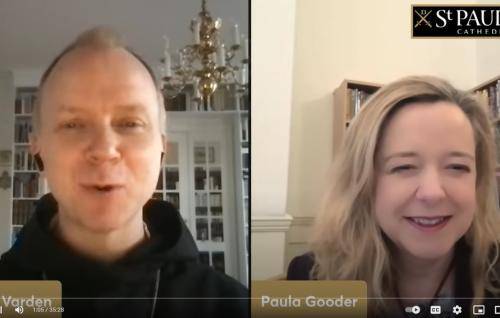Grappling with the Wilderness
Grappling with the Wilderness
Sanjee Perera reflects on the wilderness of Lent.
1. Expelled into the Wilderness
Before I have quite packed away Christmas decorations, Lent has crept up on me. Many of us take up the Christian traditions of fasting or giving up something, hoping that depriving ourselves of a favourite indulgence might teach us more about the obedience, suffering and self-sacrifice of Christ. But I often wonder, what did that suffering truly accomplish?
And in Lent comes the answer. The wilderness was a catalyst event. Jesus didn’t simply retreat from the crowds to rest. He was expelled into the wilderness: the Greek word in Mark’s account is ekballo (ἐκβάλλω) which means drive or force out, and it is the same word used in Genesis 3:24 when we were expelled from Eden. Theologians suggest that this is the moment that the nature of the Trinity is revealed, and this is when we fully understand the submission and obedience of the Son.
The consequence of Sin is death, and in the wilderness of Lent Jesus answers the call of love to pay its price on the cross. It would have been a violation of our free-will and self-determination if this God of Justice had imposed his limitless power and will to alter the sinful condition of humanity, to change our behaviour, to make the world more just and holy, more like heaven. And, despite theologically suspect hymns, Jesus didn’t come down to earth to take us up to heaven. He was no Orpheus descending to the underworld to take us back into the light. He didn’t come in power and beam us up to heaven, or reprogramme us, or erase all that had happened in time and space and reset time to a new Eden.
Instead, this Divine sound that created a cosmos, became the Son, the offspring of an unwed Nazarene woman, stole into the world in the obscurity of Bethlehem hidden in the fleshy folds of a virgin’s womb. And this Lent, we consider the significance of an all-powerful God, who emptied himself into this muddy blue planet, in the midst of hay-feed and stardust, and became vulnerable and susceptible, even to the Devil himself.
Divine Love drives Divine Love into the wilderness of Lent, that we might be reconciled with Divine Love.
2. Abandoned to the Wilderness
Jesus was never alone in the wilderness. The gospels tell us that the Spirit drove him into the wilderness to be tested by the Adversary, and even some wild beasts and angels make a cameo appearance. The wilderness was rather over-crowded. And yet the text resonates a sense of abandonment that echoes humanity’s exile from Eden. Since Eden we have been railing against the emptiness.
We cry with the prophet:
“Why, Lord, do you make us wander from your ways and harden our hearts, so we do not revere you? Return for the sake of your servants, the tribes that are your inheritance.”
(Isa 63:17-19)
The Old Testament is rife with beautiful poetic rants pleading with God to return to us. Our sense of loss is filled with questions, about suffering and injustice and evil, reverberating our existentialist angst. How could God stand by and allow the extraordinary suffering the world has seen in its known history. We ask, who are we? what is our purpose? where do we come from? what will happen to us? and most importantly… are we alone?
My post-doctoral studies across a number of disciplines sought the answers to these primal questions. The sciences, social sciences and humanities didn’t quite hold the simple elegant solution, the grand theory of everything we are searching for. My interdisciplinary magic-eight-ball seemed to suggest that consciousness evolved with questions that natural selection was never designed to answer, making truth and its cosmic origins just beyond the brain’s evolutionary scope.
Lent reminds us of the barrenness of the wilderness of knowledge without Divine intervention. There is wisdom and delight in the Arts and Sciences, but they do not give us enough to make sense of the chaos, to give us a reason to keep persisting, in what Rowan Williams calls in his poem Rublev ‘the chromatic pains of flesh’ of the broken wreckage of this world. Jesus was expelled into the wilderness to reveal to us that we were not alone. That Love Divine would do the unthinkable to redeem us.
Despite the enormity of sin, Divine love pursued us across time and space from Eden to Gethsemane through the wilderness of Lent.
3. Hungry in the Wilderness
Christian poets and theologians have long attempted to understand why an Omnipotent Divine might go hungry in the wilderness.
Like the Devil himself we wonder, why does He not simply bend the matter and substance of this world so that His will is done. If He is hungry, why does He not turn stones into bread, if He desires humanity to be holy, why does He not rule us and force us into a benevolent justice, if He longs to be loved why does He not compel love, this God of limitless power.
Annemarie Peiris, in her poetry asks…
“What draws you to this wilderness that does not love you? What calls you away from that perfect iridescent light that shimmers in a myriad hue like a slow falling snowstorm.
What draws you to this voice that calls your name in mockery? To this trap of love that plunged all life and magic into the distorted whimpering depths of a convulsed Sheol.”
Malcolm Guite in his poetry reverberates the pain of the wilderness.
“The Fountain thirsts, the Bread is hungry here, the Light is dark, the Word without a voice.
When darkness speaks it seems so light and clear. Now He must dare, with us, to make a choice.
In a distended belly’s cruel curve, He feels the famine of the ones who lose.
He starves for those whom we have forced to starve.”
When the Adversary said, you are hungry, use your power to manipulate this stone into bread, to turn mass and matter according to your Divine desire, He instead considered what might sustain us. ‘Man does not live by bread alone’ He said, and turned to a ministry that would bear fruit in His body and blood as perfect sacrifice, so that we might eat of it and be nourished to reclaim eternity.
Like a fragile faint child, we whimpered from the desolation, turning blue with cold and sin, lost amongst the tumble weed of time. And a lamb as pure as snow was at an altar bled, so that we might eat His flesh and drink His blood and live.
4. Lost in the Wilderness
I had just been writing a paper on visual perception and the cognitive determinants of the colour blue. Recently some have argued that sometimes blue is our best guess at wave particles beyond the brain’s observational scope. Despite developing colour perception about 30 million years ago, some suggest we didn’t develop a word for the colour blue till a few thousand years ago. Homer doesn’t mention blue once. He mentions black 170 times, white 100 times, red 13 times, and yellow and green about 10 times. Anthropologists and philologists have been fascinated about this confounding absence of blue. India, China, and Iceland also have a bizarre absence of the colour blue in their ancient texts.
But we perceive things we rationally know aren’t blue, as blue. We know that water is not blue, and yet lakes, seas and rivers look blue to us. We know that the stratosphere and troposphere are not blue, air is not blue, and yet we perceive the sky as blue.
Listening to the commentary on the recent Asbury Revival, I echoed an age-old question of the Wilderness, like Moses, Elijah and even John the Baptist. When even our fluctuating senses cannot be trusted, how do we know this is of God? How do we recognise this immortal invisible that is obscured in a billion interpretations of the Divine, abstracted in every culture and country and community?
As a species our cognitive capacities are still evolving. Paul in his epistle to the Corinthians, warns us that we only see in part. The gospels demand we pay attention, look more carefully, to watch and wait. And like Elijah we scrutinise the earthquake, the wind and the storm, so that we might come upon the ‘still, small voice’.
We might wonder how we might recognise the Divine. But remember…we are breathed into life by that which has no beginning nor end; when that still small voice speaks, when confronted by the Divine, we know.
Deep calls to deep in the roar of the waterfalls. Divine love dives into deep despair of the wilderness and seeks us out.
Find out more about the cognitive determinants of the colour blue.
5. The Truth of the Wilderness
We often think of the wilderness as a place we seek truth.
When Israel escaped Egypt, they entered the wilderness to seek out who they were in this promised land. But they were not always grateful for their liberation, grumbling in the trials of the journey. Many felt forced into the wilderness as they struggled, failing to understand the steadfast truth of the pillar of cloud and fire.
Often Lent seems a place we feel we have been expelled into under duress, much like Adam and Eve. We are rarely ready for it, and often struggle, pining for a lost Eden. We are often bewildered and disoriented, as each trial confounds us. Abandoned and isolated, we tread water, desperate to survive. The wilderness is rarely a place we flourish in. Nevertheless, these trials break the shell of our understanding, as the poet Kahlil Gibran says. The wilderness brings clarity and illumination.
Cognitive research holds that the more affluence, power and privilege you have, the less capacity you have for empathy and perspective taking. The wilderness breaks the hardened stone of the seed of God breathed humanity, and teaches humility, vulnerability and the extraordinary tenderness of a cosmic love.
And yet, the wilderness looks absurd to us. Jesus, just after the triumph of His baptism and His royal affirmation by the Divine Father, equipped and ready for his ministry, entering into this desolate misery was a paradox beyond our understanding. And if we think it is on the cross that Jesus took on the great misery and suffering of the human condition, we underestimate the significance of the Wilderness. Jesus was expelled into the wilderness and was tested by the adversary so that He might share in the trial and torment of our exile from Eden. He went into the wilderness to grapple with our truth in a bewildering humility seeking our desolation and destitution, so that we might know his. In the Gospel of John, Thomas said to the Lord, “we do not know where You are going, and how can we know the way?”
And Jesus said, “I am the way, the truth, and the life. No one comes to the Father except through Me.








